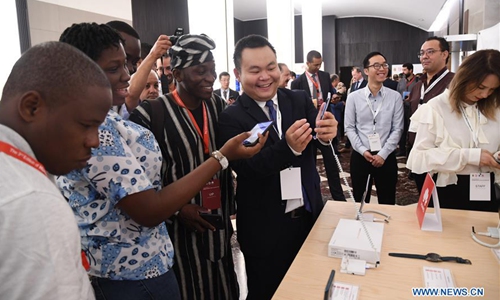HOME >> OPINION
Chinese tech firms need to grow freely in Africa
By Adhere Cavince Source:Global Times Published: 2019/12/15 16:43:39

A staff member of Huawei introduces the latest technology of Huawei products to visitors from Benin at a forum of Northern Africa Innovation Day in Tunis, Tunisia, on September 23, 2019. Photo: Xinhua
In May 2019, US President Donald Trump issued an executive order, laying the groundwork to block Chinese telecommunications companies such as Huawei from selling equipment in the US. While the move signaled intensification of the trade spat between the world's two largest economies, the implications reverberated beyond Washington and Beijing.In Kenya, the news that Huawei was banned from using its license for Google's Android operating system threw users of the brand into panic, many taking to social media to express their fears.
It was the first time that the China-US trade war made sense to a majority of Kenyans. The same situation was repeated in a number of African capitals including Lagos and Johannesburg.
While Huawei is in the eye of the storm at the moment, another firm from South Korea, Japan, Finland, Turkey or India having international presence could face the same fate, creating a whirlpool of setbacks that Kenya and other African countries may struggle to overcome for decades.
Huawei, for instance, has been at the heart of technological reforms and modernization of Africa's information technology sector for nearly three decades. The company took the risk and began investing in inaccessible regions of the continent when others only considered the continent's value in terms of rare earth minerals and other raw materials. In the process, Huawei gained valuable lessons which enabled it to deliver customer specific technology solutions for a horde of governments and private entities, giving it an edge over contemporaries.
Many African governments and enterprises turned to Huawei for affordable and high-quality infrastructure, smart phones, computers and even fiber optics.
In Kenya, the revolutionary mobile money services, M-PESA, runs on Huawei backbone. The company is also set to assist Kenya to build the Konza Data Center and Smart City. It's estimated that the first phase of the project will create over 17,000 jobs and contribute $887.1 million to the economy.
Huawei has been equally proactive in nurturing young talent through its labs based in a group of African countries including Kenya, besides providing employment to some 2,500 Kenyans.
The focus on Huawei woes could however easily distract us from the big picture. Chinese companies have had to weather many challenges to perfect their business in the continent. The valuable lessons learned and deepening trust have enabled the enterprises which are largely private, to deliver solutions across sectors.
Some like Huawei have creatively used their understanding of the continent to fulfill key requirements including in emerging areas such as cloud computing, and artificial intelligence. It is estimated that be it on the infrastructure front or in the telecommunications sector, Chinese firms, finances and technology have impacted Africa. African youth, who are increasingly skilled and hungry for new technologies that can improve connectivity with the rest of the world, depend largely on smart phones and networks from China.
Although the cooperation has faced challenges, undermining China's impact in Africa is foolhardy. Allegations of covert spying by Chinese tech firms on behalf of Beijing have been reported in Africa and beyond. It is indeed the basis upon which US President Donald Trump is on an overdrive to push Huawei out of business.
In my view, it is the responsibility of both African entities and business partners to ensure business ventures do not put the state, organizations or even individuals at risk.
In addition, agreements with foreign firms, be they Chinese or otherwise, should also cover pertinent yet critical areas such as intellectual property protection, guarantees of privacy, and skills and technology transfer.
Given the interconnectedness of the global value chains, China-US trade spat will certainly continue to negatively impact other economies including those in Africa. The continent is now staring at a binary choice of either Beijing or Washington, something that could drastically reverse the gains made in various development spheres.
In order to realize sustainable development for its 1.2 billion people, African countries should proactively promote multilateralism and free trade. This is the spirit of the Africa Continental Free Trade Area. The ambitious plan that seeks to bring all African Union members under a single market can only be realized through strategic partnerships with firms which are responsive to African aspirations and needs as outlined in the Africa Agenda 2063.
The author is a scholar of China-Africa Relations & PhD Candidate in International Relations at the Central China Normal University. Follow him on Twitter: @Cavinceworld. opinion@globaltimes.com.cn
RELATED ARTICLES:
Posted in: VIEWPOINT